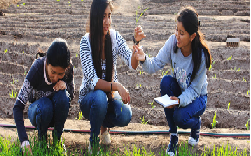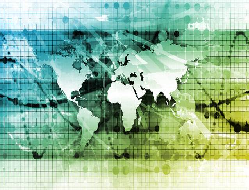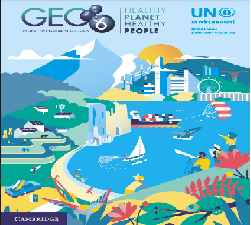April 2019 Sustainable Development
Read the articles selected in April 2019
International Mother Earth Day 22 Aprile
Source: https://www.un.org

This international Day celebrates what is common to the whole humanity. Only the tie with Mother Earth, from a no-anthropocentric perspective, makes us on touch with the living beings and with the social, economical and environmental needs of the present and future generations.
Read more:
https://www.un.org/en/events/motherearthday/index.shtml
How to win public support for a global carbon tax
By Stefano Carattini, Steffen Kallbekken&Anton Orlov
Source: Nature, 16 January
Taxes on carbon are an effective strategy to cut greenhouse gases, but they aren’t generally well welcomed by the public opinion. Public support depends on their design. Implementing carbon-pricing gradually and a harmonized distribution of its revenues are the key of success.
Read more:
https://www.nature.com/articles/d41586-019-00124-x
New climate models predict a warming surge
By Paul Voosen
Source: Science, 16 April
After the new models used to simulate global climate patterns , the world could warm 2°C within the next few decades, revealing a dangerous trend toward a 5°C rise in temperatures over preindustrial levels, which has less time to be contrasted than thought.
Read more:
https://www.sciencemag.org/news/2019/04/new-climate-models-predict-warming-surge
Financing climate objectives in cities and regions to deliver sustainable and inclusive growth
Source: oecd.org
Cities and regions are the major contributors to spending related to climate mitigation and adaptation, and given that climate change exacerbates the effects of structural inequalities in cities, investments in low-emission urban infrastructure have positive impacts on vulnerable populations.
Read more:
http://www.oecd.org/cfe/Financing-Climate-Flyer.pdf
Financing a resilient urban future
Source: World Bank
A city is “a system of systems” that individuate different funding sources, less or more dependent on governmental transfers or development assistance. The World Bank’s City Resilience Program intends to help local govenments to access to public finance supporting climate resilience with a more holistic approach.
Read more:
Microplastics are blowing in the wind
By Andrea Thompson
Source: Scientific American, 15 April
Plastics is falling down like rain. A study published in Nature Geoscience reveals the discovery of polymers in microparticles in the Pyrenees, transported there by atmospheric currents coming from areas more populated and distant of the Planet.
Read more:
https://www.scientificamerican.com/article/microplastics-are-blowing-in-the-wind/
World Water Development Report 2019
Source: the United Nations

In the 2030 Agenda, nothing like the right to water and sanitation is so essential to human health and dignity and touches on the most vulnerable and discriminated people, and is therefore at the hearth of the human rights. The international law obliges States to create the conditions for an universal access to hydric services.
Read more:
https://unesdoc.unesco.org/ark:/48223/pf0000367303
Frontiers 2018/2019
Source: UN Environment
Synthetic biology is a tool which reduces the environmental impact of the industrial production and helps to fight diseases, but presents also imprevedible and irreversible risks, both environmental and geopolitical, requiring therefore good governance and a responsible use.
Read more:
https://wedocs.unep.org/bitstream/handle/20.500.11822/27538/Frontiers1819.pdf?sequence=1&isAllowed=y
More than 75% decline over 27 years in total flying insect biomass in protected areas
By Caspar A. Hallmann etc.
Source: PLOS
The decline in insect biodiversity and abundance, as a result of the deterioration of habitat quality due to climate change has direct consequences on the echosystem's fundamental processes. It’s of outmost importance to know the mass of this decline for the assessment of biodiversity conservation and the echosystem’s health.
Read more:
https://journals.plos.org/plosone/article?id=10.1371/journal.pone.0185809
Health at a Glance: Europe 2018
Source: oecd.org
This report, as a product of the close collaboration between Oecd and the EC, highlights the need to pay more attention to mental health and the reduction of wasteful spending, acknowledging the gains in life expectancy, related to the growth in level of instruction.
Read more:
About Health 2020
Source: https://www.who.int/
Health is crucial to realize the potential of everyone and to achieve other goals. Health 2020 is an European policy framework based on the definition of health as a human right and aimed at improving health for all and reducing inequalities in the access to healthcare.
Read more:
A closer look at Water and GHG emissions disclosure
Source: GRI

The impact of business on global issues like climate change and human rights influences the finance. This report wants to help to develop standards on sustainability reporting, and from this point credibility and trust by the investitors , what makes possible a more sustainable economy and world.
Read more:
Sustainable development: for whom?
Source: Gcap Italia
Human rights are not a remedy for the excluded, but are the foundation and the structure of all development policies. They don’t belong to the private space and are in conflict with economic interests. This is the reason of the Binding Treaty on corporations and human rights promoted by the UN.
Read more:
The Clean technology Fund and Concessional Finance
Source: Bloomberg NEF
The success of the Clean Technology Fund in lowering the cost of capital of renewables has changed the economics of clean energy and strengthened the role of finance in promoting the production and consumption of zero-carbon energy.
Read more:
Climate change will raise mosquito risk
By Emily Holden
Source: The Guardian, 29 March
After a study published in PLOS Neglected Tropical Diseases the hotter temperatures risk to cause the spread of diseases transmitted by mosquitos that could kill more than a half billion people within 30 years, unless global warming is stopped.
Le Pape appelle l’Europe à accueillir plus de migrants
By J.M.G.
Source: Le Figaro, 1 April
The discourse on migrants by Pope Francis from Morocco tells the proper sense of the Cristianity in the relation with those who knock to our door, and sees in the hospitality a strength and a wealth which has nothing to fear from the Islam’s superiority in numbers.
Building a tubercolosis-free world: the Lancet Commission on tubercolosis
Source: The Lancet, 20 March
The tubercolosis is the infection most mortal and widespread in the world. Given the relation between the disease, poverty and underdevelopment, it requires not only more research funding but also a global political effort toward the achievement of the SDGs, as declared at the UN High-Level Meeting on tubercolosis.
Read more:
https://www.thelancet.com/pdfs/journals/lancet/PIIS0140-6736(19)30024-8.pdf
GEO6: Global Environmental Outlook
Source: UN Environment 2019

The sixth Global Environmental Outlook follows a series of independent studies on the state of the environment, highlighting the link between the Planet’s health and human health, as well the environmental foundation of economies and societies, shaken by unsustainable production and consumption patterns.
Read more:
https://wedocs.unep.org/bitstream/handle/20.500.11822/27652/GEO6SPM_EN.pdf?sequence=1&isAllowed=y
La ONU pide medidas urgentes ante el desastro medioambiental
By Manuel Planelles Esther Sánchez
Source: El País, 14 March
Air pollution, reduction in fresh water, loss in biodiversity are the major environmental problems identified in the ONU’s GEO report calling Governments for urgent and radical measures, since the progresses made in the direction of the Paris Agreement and the 2030 Agenda are too slow.
World Employment Social Outlook
Source: ILO
This report presents the situation of the workers in the world in the articulated meaning of the SDG8 in terms, both objective and subjective, of prosperity and well-being. While the definition of work evolves in the time, it remains the concrete measure for the principles of equality, democracy, sustainability and social cohesion.
Read more:
Die Umwelt ist kein Thema der Moral
By Lisa Mayr
Source: Der Standard, 15 March
After Michael Braungart the ethical print of the ecologism, which is translated in a message to not do, or to make less harm to the nature and our neighbor, is less useful for the ecology. But if we invert this message in a positive sense, we can understand it as a genuine theme of innovation.
Info
- Pubblicato il : 06/05/2019 Modificato il : 06/05/2019

